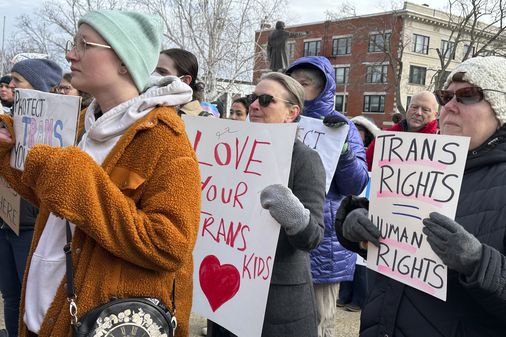CONCORD, NH — Health care for transgender people has become a hot political issue, and providers in New England say the political debate around gender-affirming care is making their job harder.
Dr. Frances Lim-Liberty, pediatric endocrinologist, and Jessica Smith, endocrinology nurse practitioner and program coordinator for the state’s only pediatric and adolescent trans health program at Dartmouth Health, spoke with the Globe about the care they provide. The program has grown steadily since its launch in 2014 and now serves approximately 500 youth in New Hampshire, Vermont and northern Massachusetts.
Lim-Liberty and Smith addressed the most common myths surrounding trans health care, how this care helps young people, and how terrified patients are that they no longer have access to it.
Q: You say there is no lower age limit to start seeing patients in clinics. When it comes to families with young children, why do they seek care?
Lim-Freedom: Many have questions. They want to know how to support their children. They are looking for therapists and mental health specialists who understand childhood development and gender identity.
We spend a lot of time advising. The greatest gender-affirming medical care we provide is guiding the family to resources, answering questions about puberty, where to find gender-neutral clothing, where to find an understanding hairdresser. We have support groups and a library with books and teaching guides. We try to fill in the gaps.
Q: What types of medical care do you provide?
Black-smith: If someone thinks about medical affirmation, he first meets with social worker, psychologist, endocrinologist and therapists. There is a team ready before we start.
Lim-Freedom: We are very careful in our approach. By the time we are ready to start a puberty blocker or estradiol or testosterone, we have had many conversations and discussions.
Q: How do you speak to parents who may not understand gender-affirming healthcare?
Black-smith: Usually these kids are in real pain the moment they see us. We try to engage parents by bringing in the mental health team and talking about the importance of treatment and what it’s going to look like. When we have a young person struggling with gender dysphoria distress, we need to treat them the same way we treat any other medical diagnosis. The results are good.
Lim-Freedom: The most important part is sorting out the myths they’ve heard and the biases they hold.
Q: What are the most common myths you come across?
Lim-Freedom: This gender is binary. We are all brought up in a binary world. We get them to start thinking about gender as a spectrum and talking about what it’s like to have both male and female aspects.
Black-smith: We spend a lot of time talking about the fact that gender identity is not easily influenced. It’s normal for their teenager to hang out with other trans kids. They find each other naturally, like athletes who find each other and become friends.
Q: We talk a lot about puberty blockers. What are they and when are they used?
Black-smith: There is a great spread of misinformation about puberty blockers. People who have an anti-trans agenda are trying to use this as a scaremongering tactic to say we’re hurting young people and that’s absolutely wrong.
Puberty blockers have been used in pediatric endocrinology for decades to treat precocious puberty, so there is a very good amount of data demonstrating safety and effectiveness. We use puberty blockers to suspend puberty for young people exploring their gender identity.
These are completely reversible drugs. If a young person wants to stop the blocker and go through their natal puberty, we can do it safely and without bad results. If someone decides to switch from a puberty blocker to gender-affirming hormone therapy, we can do that too.
Lim-Freedom: Many studies show positive effects on mental health: lower rates of depression, lower suicidal tendencies and suicidal ideation. Jess and I experience this every day when we are at the transgender clinic. We see these children change, we see them blossom, we see them become the people they say they want to become on that first visit. We see them go from being reserved and quiet to being interested in activities or opening up to something they really enjoy.
Q: The New Hampshire Legislature considered a bill this session that would restrict the type of care you can provide. How does it feel to do this job now given the political climate?
Lim-Freedom: It is very difficult to be told that your work is bad. It’s very hard to be told that the trans kids you care for every day shouldn’t exist. I have never, in any of the other endocrine conditions or diseases, had to defend someone for being who they are.
I don’t like fighting the law. It’s not my training. It’s not something I learned in medical school. While I am honored to do so, it also takes away from the clinical work I have to do here. It’s not fair to our children.
We want our program to grow, and when we don’t have the time and the resources to do that because we’re at Concord explaining that what we’re doing is best medical practice, that’s…I don’t I don’t even have the right word: exasperating, frustrating, unfair.
Black-smith: Gender-affirming care is life-saving work, and to have people without an ounce of medical training saying that we are harming children – it certainly affects us, but it has an incredible impact on our patients who are already marginalized and at risk. They’re terrified of losing their care: What if New Hampshire bans gender-affirming care? Where are we going? What are we doing? We need to realize the impact this has on the trans community.
